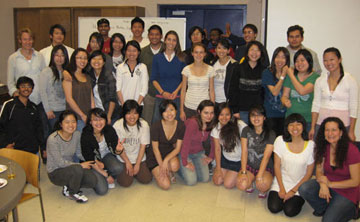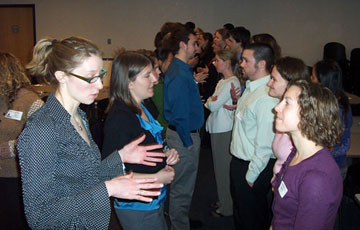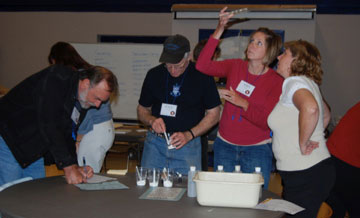
Preservice Teachers or Science Majors

University Science Educators

Classroom Teachers

Preservice Teachers or Science Majors

University Science Educators

Classroom Teachers
We have participated in a number of different uses for this course, which have led to important adaptations for each audience. It has served as a much-needed tool for universities and colleges who are engaged in science outreach programs to their communities and to K–12 students, such as the many NSF-funded GK–12 sites. Delivered in its entirety or as part of a teacher institute, the sessions and activities of the course make a highly effective and innovative vehicle for the professional development of teachers at all levels of experience and background. It has been an excellent resource in preservice education at several universities, who have built science methods courses around the topics addressed in the sessions. It can also, as described here, provide important training and new awareness of career options to undergraduates and graduate students in the sciences who may wish to explore the field of science education.
Depending on your own situation, you will need to take your audience into account in a variety of ways. Understanding the audience will be crucial in helping to gauge the terminology and language you use and to select the major points to emphasize. Participants who have been exposed to education courses may be more familiar with terms and educational theory, such as constructivism and formative assessment, and have an interest in pursuing research articles on pedagogical topics. Experienced teachers should be able to contribute direct evidence of how instructional strategies and approaches can be applied to classroom teaching, and might gravitate toward practical exemplars and strategies. You may also take into consideration the technical and conceptual intricacy of the science content that is introduced, by tailoring the exemplar science activities as best fits your participants. If presenting a session to university science students or faculty, you may need to choose more sophisticated science content in order to keep them engaged as learners. When appropriate, we have provided specific suggestions for some of these options. We would caution, however, that even chemical processes that seem to be relatively “simple” can be quite complex to clearly explain what is happening—or teach it to someone else! It’s also worth remembering that an activity or metaphor that some may judge as oversimplified, can nonetheless become an excellent launching pad for an in depth group discussion about how one comes to fully understand the concept.